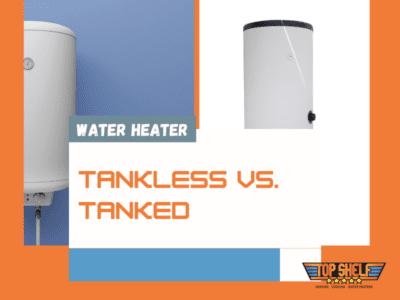Are you in the market for a new water heater and unsure whether to purchase or install a tankless or storage tank model? With the rise in tankless water heaters, the days when your basement or garage housed a large tanked water heater slowly ended.
Sometimes called “On-demand water heaters,” tankless water heaters provide hot water more efficiently and don’t store the hot water like tank storage water heaters. That is not to say that your old-school water heater with a large tank isn’t suitable either. Both tankless and tank water heaters have pros and cons, which we will discuss in our guide below today!
Here is to figure out which is best for you regarding your hot water heater!
Tankless vs Tanked Water Heater:
What is a Tankless Water Heater?
A tankless water heater, often called an on-demand water heater, is the sprinter in the water heating world. Instead of storing hot water, this energy-efficient marvel heats water only when needed.
Here’s the scoop on tankless water heaters:
- Instant Heating: Water heats up as it passes through the unit.
- No Storage Tank: Frees up space in your home.
- Energy Efficient: Only uses energy when hot water is needed.
Tankless water heaters are perfect for households looking to save on energy bills and reduce their carbon footprint. Unlike storage tank water heaters, tankless heaters provide a continuous hot water supply, so you’ll never face the dreaded cold shower.
It’s the type of water heater that keeps up with your busy lifestyle—efficient, compact, and always ready to go.
Cons of Tankless Water Heater:
- Limited flow rate
- More upfront costs to installing
- More expensive to purchase and install
- Electrical or power loss means no hot water
What is a Tank Water Heater?
A tank water heater, also known as a storage-tank water heater, is like that trusty old friend who’s always there when you need a hot shower. It stores hot water in a tank, ready for use whenever you turn on the tap.
Here’s how a tank water heater works:
- Storage Tank: Keeps a reserve of hot water, hence the name tank storage water heater
- Heating Elements: Warm the water inside the tank.
- Energy Efficiency: Not as high as tankless water heaters, but reliable.
While tank water heaters provide consistent hot water, they take up more space and can run out of hot water during high demand (though rare). Think of it as the tortoise of tank water heaters—steady and dependable but not the fastest on the block if you run out! Tank water heaters typically run at a lower cost and require less installation than tankless water heaters.
Cons of Tanked Water Heaters:
- Higher energy use
- Gas water heaters require a gas line and open flam to operate
- Shorter lifespan
- Large and bulky (takes up a lot of space)
Tankless vs. Tank Water Heater: Major Differences
Choosing between tankless and tank water heaters can be like deciding between a speedy sports car and a reliable family van. From retrofitting your plumbing to making way for a new tankless water heater to simply replacing the old tank of your existing water heater, there are pros and cons to each.
Here are the top 6 differences to consider:
Hot Water Supply:
- Tank Water Heaters: Store a large amount of hot water in a tank, ready for use anytime. However, once the tank runs out, you’ll wait for it to heat water again.
- Tankless Water Heaters: Heat water on demand. You’ll get an endless hot water supply, but multiple simultaneous uses can stretch its limits.
Energy Efficiency:
- Tank Water Heaters: Keep water hot 24/7, which means they always use energy, even when you’re not.
- Tankless Water Heaters: Only use energy when you need hot water. They’re more energy-efficient and can help reduce your utility bills over time.
Space Requirements:
- Tank Water Heaters: These big boys need a lot of space, which can be problematic in smaller homes or apartments.
- Tankless Water Heaters: Compact and wall-mounted, freeing up valuable floor space. Perfect for those tight on space.
Initial Cost:
- Tank Water Heaters are generally cheaper to purchase and install, making them a good option if you’re on a tight budget.
- Tankless Water Heaters: There are higher upfront costs, especially for electric tankless water heaters, but the energy savings can pay off in the long run.
Maintenance and Lifespan:
- Tank Water Heaters: Easier and cheaper to maintain but have a shorter lifespan of about 10-15 years.
- Tankless Water Heaters: These require regular maintenance to keep them running efficiently but can last up to 20 years or more.
Performance in Cold Weather:
- Tank Water Heaters: Consistent performance regardless of outside temperature, thanks to the insulated tank.
- Tankless Water Heaters: These can struggle to heat water quickly in frigid climates like Boise, requiring a powerful unit or multiple units to meet demand.
Deciding between a tankless water heater and a tank water heater depends on your household’s needs and budget. Whether you prefer the steady reliability of tank water heaters or the modern efficiency of tankless water heaters, there’s a solution that fits your lifestyle.
Finding the Perfect Fit: Tank and Tankless Water Heater Sizes
Before diving into the details, it’s worth noting that sizing your water heater is best left to professionals. This guide is for general information.
1. Calculate Peak Hour Demand for Storage Tank Water Heaters
To size a storage tank water heater, determine your household’s peak hour demand. Add up the gallons-per-minute (GPM) flow rates of all appliances and fixtures that use hot water during the busiest hour of the day. For example, a shower (20 gallons), a dishwasher (7 gallons), and a washing machine (25 gallons) might all run at once.
The total demand of 52 gallons means you’ll need a tank water heater with a first-hour rating (FHR) that meets or exceeds this number.
2. Determine GPM and Temperature Rise for Tankless Water Heaters
You’ll need to know the GPM and the temperature rise required for tankless water heaters. Calculate the total GPM needed during peak usage by adding the flow rates of appliances you’ll use simultaneously. If your shower (2.5 GPM), dishwasher (1.5 GPM), and faucet (1 GPM) are all running, you need a tankless water heater with at least 5 GPM. Also, consider the temperature rise—from groundwater temperature (e.g., 52°F) to your desired hot water temperature (e.g., 110°F).
3. Match Capacity to Household Needs
Once you have your peak hour demand or GPM requirements, match this with the capacity of available water heaters. For storage tank water heaters, ensure the FHR matches your peak demand. Choose a unit that meets your GPM needs and has the appropriate temperature rise for tankless water heaters. This ensures a continuous hot water supply, fitting your household’s daily needs without unnecessary energy consumption.
Gas or Electric: Which Powers Your Hot Water Best?
When it comes to heating water, professionals often choose gas tankless water heaters because of their superior performance and efficiency. Here are the top 5 reasons why gas might be the best option for you:
1. Energy Efficiency
Gas tankless water heaters are typically more energy-efficient than their electric counterparts. They heat water on demand, meaning you’re not wasting energy keeping a tank of water hot all day. This efficiency can lead to noticeable savings on your utility bills, especially if you have a more enormous household.
2. Performance and Speed
Gas heaters generally heat water faster than electric ones. Whether you’re using a tankless water heater or a traditional one, gas units can deliver hot water quickly and in more significant quantities. If you hate waiting for your shower to warm up, gas might be the way to go.
3. Operating Costs
While the initial cost of gas water heaters can be higher, the lower cost of natural gas compared to electricity often means you’ll save money over the long term. Gas is generally cheaper than electricity in most regions, making gas tankless water heaters a cost-effective choice for many homeowners.
4. Durability and Lifespan
When comparing their lifespan, tankless water heaters, especially gas-powered ones, have a longer lifespan than electric tank water heaters. They are built to handle the rigors of frequent use, and with proper maintenance, a gas tankless water heater can last 20 years or more, outlasting many electric models.
5. Environmentally Friendly Options
Modern gas water heaters, including tankless ones, have become more environmentally friendly. They produce fewer emissions than older models, and with the rising availability of natural gas, they are a greener option for those looking to reduce their carbon footprint.
The Verdict –
Tankless water heaters typically cost more than traditional tank water heaters. However, many homeowners around Boise, Idaho, are switching to tankless water heaters when they have to replace their water heaters.
No one wants cold water, so when you have to fix your water heater issue, whether you choose a tankless heater or a storage tank model will depend on what best fits your budget and home. However, choosing who installs your new water heater shouldn’t be hard—choose us!
Let Top Shelf Heating & Cooling help you with your water heater! Contact us below to see how we can help you with energy costs, your water heater, and other possible solutions for your home!
GET IN TOUCH


 10 Fast Ways To Improve Indoor Air Quality
10 Fast Ways To Improve Indoor Air Quality